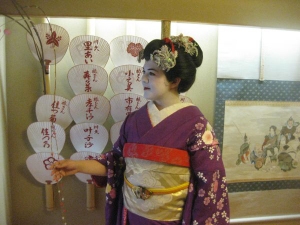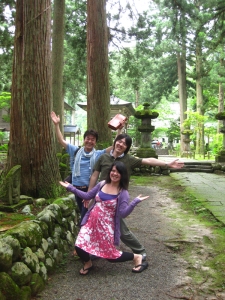Multilingualism: Just Another Diagnosis for Split Personality Disorder?
Winter has descended on Shanghai. I’m wearing four layers of pajamas, snuggled underneath two sets of comforters, and sipping on a piping hot cup of Jasmine tea.
As I burrow myself deeper underneath the covers and try to escape the force that is winter in Shanghai, I browse various articles online.. While reading the Economist I skimmed this interesting little read on Multilingualism: Do Different Languages Confer Different Personalities?
Before reading the article, I’m sure all of you bilinguals out there have “no duh” echoing through your head. The article’s main focus is in regard to how these various personalities can be attributed to cultural differences rather than linguistic ones; and how, depending on the culture and customs of your language, you yourself also change.
Although I can’t vouch for European languages, when I speak Japanese or Chinese I don’t even feel like Mary. When Mandarin escapes my lips I instantly transform into loud and aggressive 海若兰, and when I’m whispering sweet Japanese platitudes while serving tea, Mary becomes メアリー.
I’d like to introduce these two other halves of myself. I’m sure fellow speakers of Japanese and Chinese probably have a lot in common with my equivalents of Dr. Jekyl and Mr. Hyde.
Japanese Mary:
Japanese Mary is always aware of how she looks and presents herself. When she sits down at a meeting, she has perfect posture and places both hands on her knees (like a good Japanese girl should). Heaven forbid if Mary starts bouncing her knee or even crossing her legs–that is so un-lady like and impolite. If at the dinner table, she always covers her mouth with her hand when chewing food or laughing. If anyone’s glass is to become empty she instantly refills it. If having yakiniku or some other communal meal, then she always checks that the meat is being barbequed properly or the food is being evenly dispersed among the guests.
Japanese Mary never speaks in a loud voice (unless under the influence of alcohol, but even then it’s pretty low key compared to Chinese or American Mary).
Japanese Mary is always apologizing and bowing. She always smiles.
Japanese Mary always thinks twice about what she is going to say. She’s in constant fear of offending the other party or using improper keigo or mannerisms, so every single sentence requires the utmost of consideration and deliberation. She cannot ask direct questions and she cannot be too imposing.
Japanese Mary slurps ramen. Even if it is a manly thing to do.
Japanese Mary is very attentive and thoughtful. She also enjoys the small things in life, like a cup of coffee in the morning with her boss or a fresh draft beer with her co-workers after a long day of work.
Japanese Mary always sits in seiza (on knees) if in a tatami mat establishment. This is a bad habit picked up from calligraphy classes (she can last 30 min, max).
She is polite, she is sweet, and most of all she is cautious with her words.
Chinese Mary:
Chinese Mary will talk to anyone. She doesn’t care about what she says or how personal it may be–all questions are out in the open. Chinese to 海若兰 is basically like verbal diarrhea.
Chinese Mary is crass and offensive. If she thinks something is too expensive, she’ll say it’s too expensive. If she thinks that shirt looks ugly on you, then she’ll say that shirt looks ugly on you. If you smell funny, then Chinese Mary aint afraid to say: “you stink.”
She doesn’t care about how she looks or what people think of her. Chinese Mary could randomly burst into song at a crowded metro station and couldn’t care less about who was looking or how crazy everyone thinks she is.
Sometimes she forgets to say ‘please’ and ‘thank you,’ because no one here expects it of her.
Chinese Mary is loud. When answering the phone she’ll shout an ear piercing “WEI!” and automatically raises her voice for any and all kinds of conversation.
She doesn’t mind elbowing or kicking people to get where she needs to be. Chinese Mary is quick to anger as well; if you don’t treat Chinese Mary nice, she’s going to rip you a new asshole in Mandarin.
At dinner, Chinese Mary will spit meat and fish bones directly out of her mouth and onto the surface of the table (usually on a paper napkin, like the rest of her Chinese friends). She pours beer for herself and doesn’t even look at the glasses around her–if they want more, they can get it themselves. If eating Chinese, she will always make sure there is a vegetable, meat, soup and rice dish. Balance is essential for a Chinese meal. Making sure everyone is full is also of the utmost importance–order more than necessary, because it’s better to be safe than sorry.
Chinese Mary always says “多少钱“ like “duoarqian” in hillbilly fashion to get a kick out of her friends. She speaks with 儿话音, because she has Beijing pride.
Chinese Mary is upbeat and sassy, but she still tries to be friendly and approachable. She always smiles and greets anyone that is interested in talking to her. Chinese Mary will talk to anyone and will say anything–she is direct, blunt and lively.
And American Mary?
I don’t even know anymore.
But if I had to choose which Mary was more similar to American Mary, it would definitely be the Mandarin side.
If I have a choice to speak Chinese or Japanese, I usually choose Mandarin. This isn’t because my Mandarin is better; in fact, my Japanese is far better than my Mandarin especially in terms of interpreting and translating. However, Mandarin is far less troublesome when it comes to communication. In Mandarin I don’t have to constantly worry whether I’m offending the person I’m talking to, using the correct keigo, or touching on a topic that is inappropriate or potentially offensive.
Much like in English, in Chinese I can be open and honest with myself whereas with Japanese I’m constantly worried about what people think of me. Japanese Mary is far more complex than American and Chinese Mary combined–and this isn’t because Japanese is a hard language. I think Japanese doesn’t take years and an enormous amount of effort to learn just because it’s difficult linguistically–it’s because picking up the cultural habits that help you assimilate into Japanese society is complicated.
So, how do you feel when you speak a certain language? I’m curious about the effect European languages has on an American speaker (and vice versa). guess I’ll have to keep studying French to find out!
Just Being Mary
When you live in Asia as a westerner (or any kind of foreigner, really), you’re always painfully aware of the fact that you’re not one of the locals. Whether it be Japan or China, Thailand or Vietnam, the daily actions of the locals will always have you feeling like you don’t belong by the end of the day. I know I’m not Chinese, or Japanese—and again, thanks for letting me know that every living second of my life abroad.
But sometimes, you meet people that don’t care. Some people don’t even think twice about the fact that I’m from America or that I’m not a born and bred local. They don’t see Chinese, Japanese or American Mary–they merely see Mary. And these are the people you want to keep close. These are the friends that stay with you not only for the remainder of your life in Asia (or wherever you may be), but forever.
Whether I speak Chinese, Japanese or English, at the root of it all there’s still Mary. There’s a part of you that is uniquely you, and in Asia, believe it or not, there are some people that befriend you for that mere fact alone.
So no matter what language you may be speaking, stay true to yourself. Keep a part of yourself uniquely you. No matter how many ways you split yourself culturally, there’s still a part of you that is just… well, you. And that’s the most important one of all.


2 thoughts on “Multilingualism: Just Another Diagnosis for Split Personality Disorder?”
Hi, I wanted to comment even though this was written almost five years ago. What I’m finding on my journey of really wanting to become fluent in Japanese is that my personality is starting to change in an unexpected way when I speak Japanese. I’m normally a quiet person even when speaking English. And then a few weeks ago, the realization hit me that if I want Japanese people to know that I can speak Japanese, I’m going to have to, well, ummm, speak Japanese. When I’m quiet while talking to someone in English people don’t automatically assume I don’t know much English, but when I’m quiet while talking to someone in Japanese, then they automatically assume I don’t know much Japanese. Of course, I can see why this would be the assumption. So I’m pushing myself to become a very talkative person when I speak Japanese! I’m also just beginning to learn Chinese, so I’m also pushing myself to be talkative in Chinese. I don’t have the tones or pronunciation in general down good yet, but I will repeat something over and over until my Chinese friends finally understand what I’m saying. I never used to do that as a beginner in Japanese, but I’m learning from my mistakes. Thanks for writing useful and insightful information about my two favorite languages in the world!!!
I notice that I go quiet whens peaking foreign languages… if I don’t have confidence in what I’m saying. I’m much louder in English than Chinese or Japanese, and I think that’s cause I have confidence in how/what I’m saying in English compared to Chinese/Japanese. Maybe that’s the same for you?
Yes, the key to learning a language is just talking–even if it’s full of mistakes, it’s better to actively practice (talking) than passively learn (listening). This is why Japanese people struggle to learn English… they are afraid of making mistakes, so they don’t even try. I can relate, cause it’s nerve wracking to put yourself out there and make mistakes, but in the end most people are happy to communicate despite the grammatical and pronunciation errors. We just have to throw ourselves out there.
Best of luck on your language learning journey! Very excited for you.